#Artist & Alphabet: Twentieth Century Calligraphy & Letter Art in America
Photo
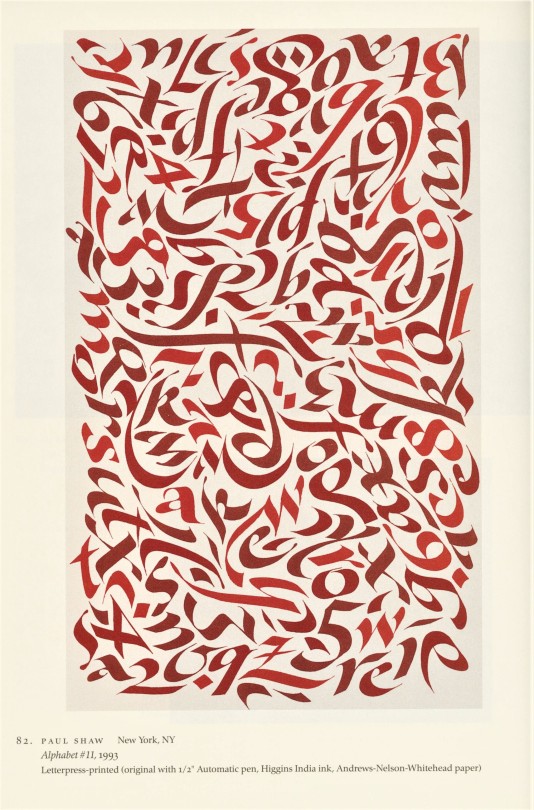
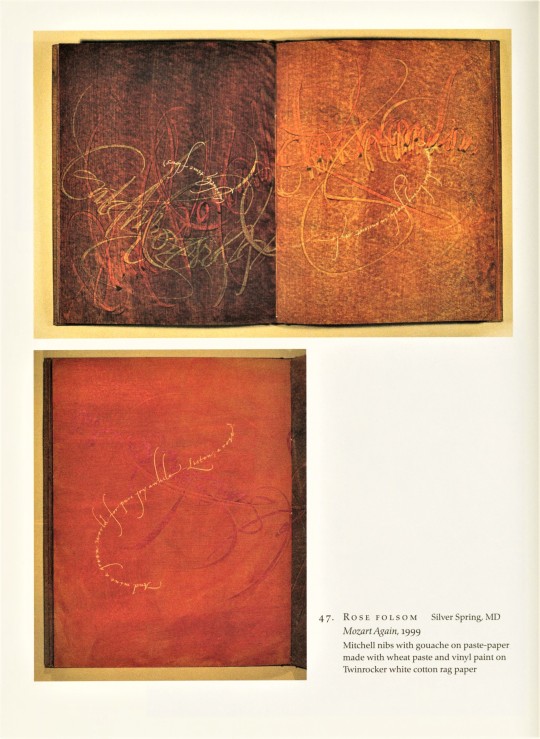
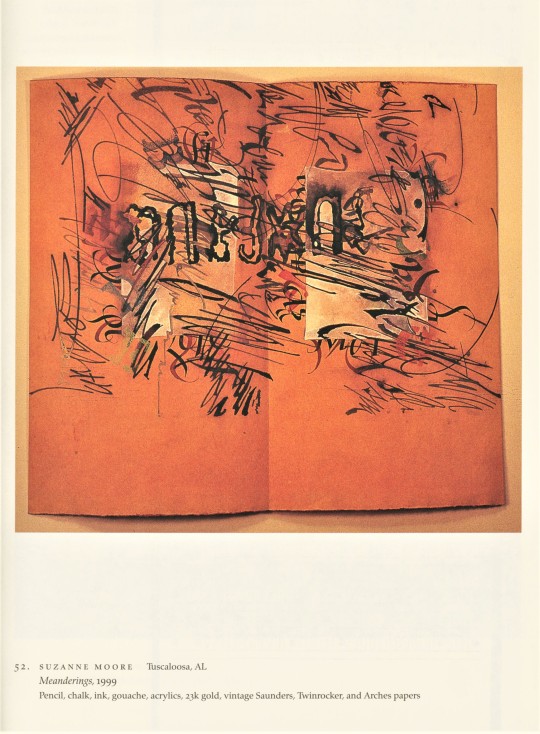


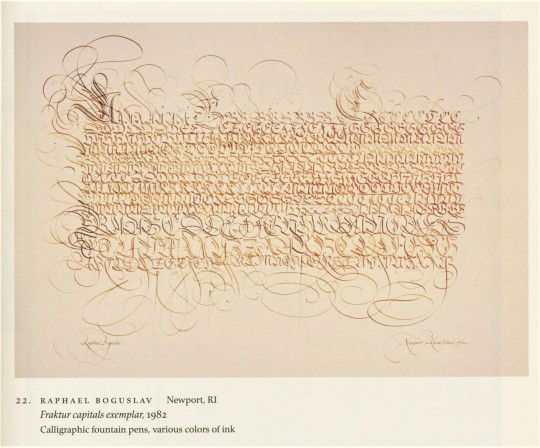

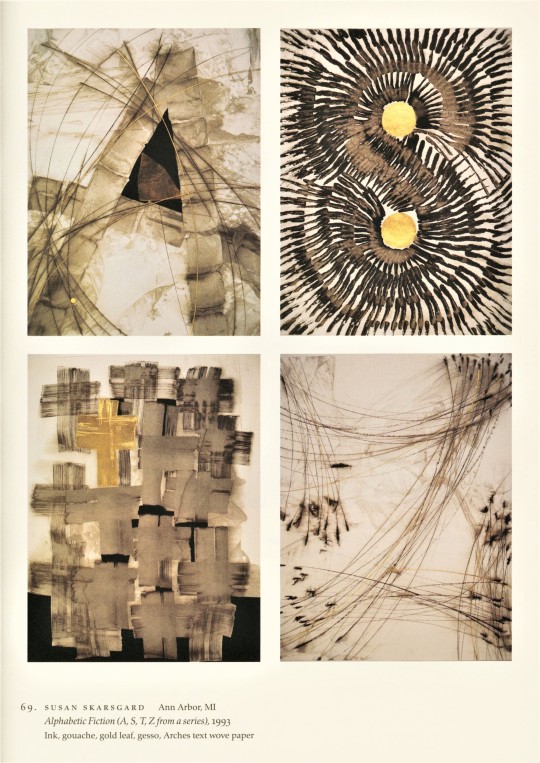

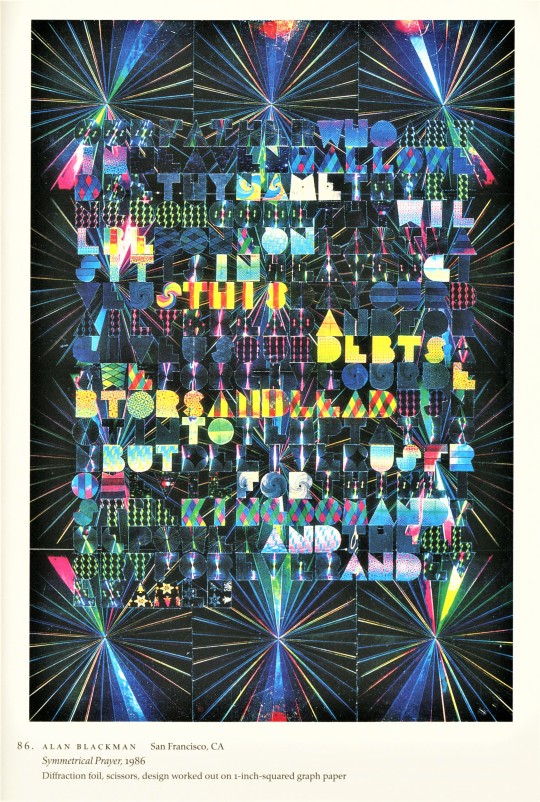
Decorative Sunday
Kandinsky said, “Letters act as practical and useful signs, but also as pure form and inner melody.” This quote appears on a Society of Scribes 10th Anniversary Keepsake from 1984, one of the pieces featured in Artist & Alphabet: 20th Century Calligraphy & Letter Art in America.
The exhibition catalog was published in Jaffrey, New Hampshire in 2000 by David R. Godine in conjunction with the American Institute of Graphic Arts and the Society of Scribes and was printed in at The Stinehour Press in Vermont. The exhibit and catalog were curated by Jerry Kelly (who was also the book designer) and Alice Koeth (who provided the title page calligraphy). The catalog includes an introduction from Donald Jackson.
While Artist & Alphabet contains a wide overview of the lettering arts of the 20th century, for this Decorative Sunday I have focused on the specimens that embody that spirit of what Jackson calls “spontaneously made, deeply personal pirouettes of the pen, blots and all.” These works show how letter forms can be utilized not just to convey information, but as a visual grammar in and of itself.
You can find more publications from Godine here.
View more Decorative Sunday posts here.
-Olivia, Special Collections Graduate Intern
#Decorative Sunday#Artist & Alphabet#Artist & Alphabet: Twentieth Century Calligraphy & Letter Art in America#David R. Godine#Godine#American Institute of Graphic Arts#Society of Scribes#Stinehour Press#Jerry Kelly#Alice Koeth#Donald Jackson#calligraphy#letter arts#decorative art#decorative arts#decorative plates#olivia
204 notes
·
View notes
Text
A Collection of Typography Books From Which You Can Learn About This Beautiful Art
I am featuring on this site frequent typographic designs, but if you only look at inspiration without actually learning about the elements of typography, how this type of design should be used and where, you might just be an amateur designer who tries his best and that is all.
To become a great graphic designer with serious knowledge of typography you have to learn either in an art school or from the best typography books that are available where you find almost everything useful on every topic regarding typography.
Don’t get me wrong, there are very good articles online, but the information is scattered on various typography sites and it takes a lot of time to find the useful articles. Moreover, you need to have all the info in one place so that you learn things in a certain order. This is why I’m recommending books on typography, rather than online articles.
Designing with Type, 5th Edition: The Essential Guide to Typography
Part textbook and part reference work, the fifth edition of a typographic classic begins with a thumbnail history of the development of written language and ends with a glossary; in between are in-depth looks at five classic typefaces, lessons on designing with text type, display type and color, and plenty of project assignments.
Thinking with Type, 2nd revised and expanded edition: A Critical Guide for Designers, Writers, Editors, & Students
Thinking with Type is the definitive guide to using typography in visual communication, from the printed page to the computer screen.
This revised edition includes forty-eight pages of new content, including the latest information on style sheets for print and the web, the use of ornaments and captions, lining and non-lining numerals, the use of small caps and enlarged capitals, as well as information on captions, font licensing, mixing typefaces, and hand lettering.
Throughout the book, visual examples show how to be inventive within systems of typographic form—what the rules are and how to break them. Thinking with Type is a type book for everyone: designers, writers, editors, students, and anyone else who works with words.
The Anatomy of Type: A Graphic Guide to 100 Typefaces
The Anatomy of Type explores one hundred traditional and modern typefaces in loving detail, with a full spread devoted to each entry.
The full character set from each typeface is shown, and the best letters for identification are enlarged and annotated, revealing key features, anatomical details, and the finer, often-overlooked elements of type design.
The Elements of Typographic Style
Renowned typographer and poet Robert Bringhurst brings clarity to the art of typography with this masterful style guide. Combining the practical, theoretical, and historical, this edition is completely updated, with a thorough exploration of the newest innovations in intelligent font technology, and is a must-have for graphic artists, editors, or anyone working with the printed page using digital or traditional methods.
Just My Type: A Book About Fonts
Just My Type investigates a range of modern mysteries, including how Helvetica took over the world, what inspires the seemingly ubiquitous use of Trajan on bad movie posters, and what makes a font look presidential, male or female, American, British, German, or Jewish.
From the typeface of Beatlemania to the graphic vision of the Obama campaign, fonts can signal a musical revolution or the rise of an American president. This book is a must-read for the design conscious that will forever change the way you look at the printed word.
Mastering Type: The Essential Guide to Typography for Print and Web Design
Packages on store shelves, posters on building walls, pages of a website—all contain information that needs to be communicated. And at the heart of that communication is type: visually interesting, interactive, expressive and captivating. Each letter must come alive; therefore, each letter must be carefully crafted or chosen. A solid foundation in typography, as well as an understanding of its nuances, will help you optimize your visual communication—in whatever form it takes.
Wolfgang Weingart: My Way to Typography
Countless designers in North America and Europe have been inspired by his teachings and lectures. In Typography, Weingart sums up an impressive lifework in 500 pages that describe his own development and the foundations of his teachings. This is a long-awaited book of epochal significance.
Logotype
Logotype is the definitive modern collection of logotypes, monograms, and other text-based corporate marks. Featuring more than 1,300 international typographic identities, by around 250 design studios, this is an indispensable handbook for every design studio, providing a valuable resource to draw on in branding and corporate identity projects. Retaining the striking black-and-white aesthetic and structure of Logo (also by Michael Evamy) and Symbol, Logotype is an important and essential companion volume.
Getting it Right with Type: The Dos and Don’ts of Typography
Typography is no longer the specialist domain of the typesetter: these days anyone who uses a computer has access to a wide range of typefaces and effects. This book offers an introduction to the basics of typography, including choosing which typeface to use; adjusting letter-, line-, and word-spacing for improved legibility; understanding kerning and leading; and mastering typographic details, such as italics, punctuation, and line endings.
The book is illustrated throughout with practical examples demonstrating good and bad solutions. There are tips for specific design tasks, such as letters, charts, tables, and design for the screen, and a glossary explaining typographic terms.
Hand to Type: Scripts, Hand-Lettering
Although, or perhaps because, most of us write less and less by hand, our fascination for handwritten letterforms is growing. Typeface designers who specialize in traditional, charming, or spectacular lettering with a handmade look have become role models for today’s young typographers and graphic design students.
1,000 Type Treatments: From Script to Serif, Letterforms Used to Perfection
1,000 Type Treatments showcases an array of fonts in a catalog-like format, making it easy for the working designer to practically shop for ideas. The book is organized by style so if a designer has a traditional, elegant, or edgy piece, they can go directly to that section of the book, where they will find a wide collection of fresh ideas in the style they are seeking.
Type Rules!: The Designer’s Guide to Professional Typography
Type Rules: The Designer’s Guide to Professional Typography, 3rd Edition is an up-to-date, thorough introduction to the principles and practices of typography. From the fundamentals to cutting-edge applications, this edition has everything today’s serious designer needs to use type effectively.
Dozens of exercises reinforce authoritative coverage on such topics as how to select the appropriate type for the job, how to set type like a pro, how to avoid common mistakes, and how to design a typeface, as well as how to fully harness the power of major design packages such as InDesign and QuarkXPress — with new coverage of their latest versions.
Typographie: A Manual of Design
Emil Ruder’s Typography is the timeless textbook from which generations of typographer and graphic designers have learned their fundamentals. Ruder, one of the great twentieth-century typographers was a pioneer who abandoned the conventional rules of his discipline and replaced them with new rules that satisfied the requirements of his new typography. Now in its sixth printing, this book has a hallowed place on the bookshelves of both students and accomplished designers.
Typography Essentials: 100 Design Principles for Working with Type
Typography Essentials is a practical, hands-on resource to distill, organize, and compartmentalize-but not to oversimplify-the many complex issues surrounding the effective use of typography. It is for designers of every medium in which type plays a major role. A deep understanding of letterforms and knowledge of the effective use of letterforms can only be obtained with constant observation and experimentation; it evolves over a lifetime of design practice and study.
Typography, Referenced: A Comprehensive Visual Guide to the Language, History, and Practice of Typography
Typography, Referenced is the single most comprehensive volume covering every aspect of typography that any design student, professional designer, or design aficionado needs to know today.
Typography Sketchbooks
Grid Systems: Principles of Organizing Type
Although grid systems are the foundation for almost all typographic design, they are often associated with rigid, formulaic solutions. However, the belief that all great design is nonetheless based on grid systems (even if only subverted ones) suggests that few designers truly understand the complexities and potential riches of grid composition.
Little Book of Lettering
This collection—large in scope but petite in size—surveys the recent lettering renaissance, showcasing a diverse range of talent in gorgeous, eye-catching examples and profiling today’s innovators. In a stunning little package that expertly combines a handmade feel with a modern aesthetic, this is the ultimate inspirational collection of contemporary lettering for design buffs and type enthusiasts alike.
Made with FontFont: Type for independent minds
The Bible of Illuminated Letters: A Treasury of Decorative Calligraphy
The ancient art of illuminating manuscripts is currently attracting many new enthusiasts among artists, art students, and lovers of calligraphy. The Bible of Illuminated Letters is a volume they’ll all want to add to their collections. It presents step-by-step instructions for recreating twelve illuminated alphabets. Among them are Celtic, Saxon, Gothic, Romanesque, Modern Revival, and seven more, including several modern scripts.
Typology: Type Design from the Victorian Era to the Digital Age
A must-have for designers, not to mention that quirky group in love with type for types sake (you know who you are), Typology is the most visually dynamic compendium of typefaces on the market. Its pages are profusely illustrated with hundreds of complete alphabets, and such original artifacts as typesheets, catalogs, broadsides, posters, and many other primary source examples. In all, Typology is the long-awaited type encyclopedia destined to be a standard reference work for years to come.
Logo, Font & Lettering Bible
Why be a designer who must rely upon preexisting typefaces and clip art when you can become the kind of designer who creates logos, fonts and lettering of your own? Leslie Cabarga, author of the bestselling Designer’s Guide to Color Combinations, has created a textbook of type for the experienced graphics professional as well as the beginning student of design.
New Vintage Type: Classic Fonts for the Digital Age
Choose, use, and understand great vintage type with this authoritative guide. Retro is the new modern. And nowhere is that fact more evident than in typography, which today uses vintage type in ads, book and magazine design, movies, and everywhere words convey meaning. Viewers may not even realize that the type itself conveys mood, information, and a sense of style, but graphic designers know the power of vintage type.
Scripts: Elegant Lettering from Design’s Golden Age
Seen in everything from wedding invitations and birth announcements to IOUs, menus, and diplomas, script typefaces impart elegance and sophistication to a broad variety of texts. Scripts never go out of style, and the hundreds of inventive examples here are sure to inspire today’s designers. Derived from handwriting, these are typefaces that are stylized to suggest, imply, or symbolize certain traits linked to writing.
from Web Development & Designing http://www.designyourway.net/blog/resources/a-collection-of-typography-books-from-which-you-can-learn-about-this-beautiful-art/
0 notes